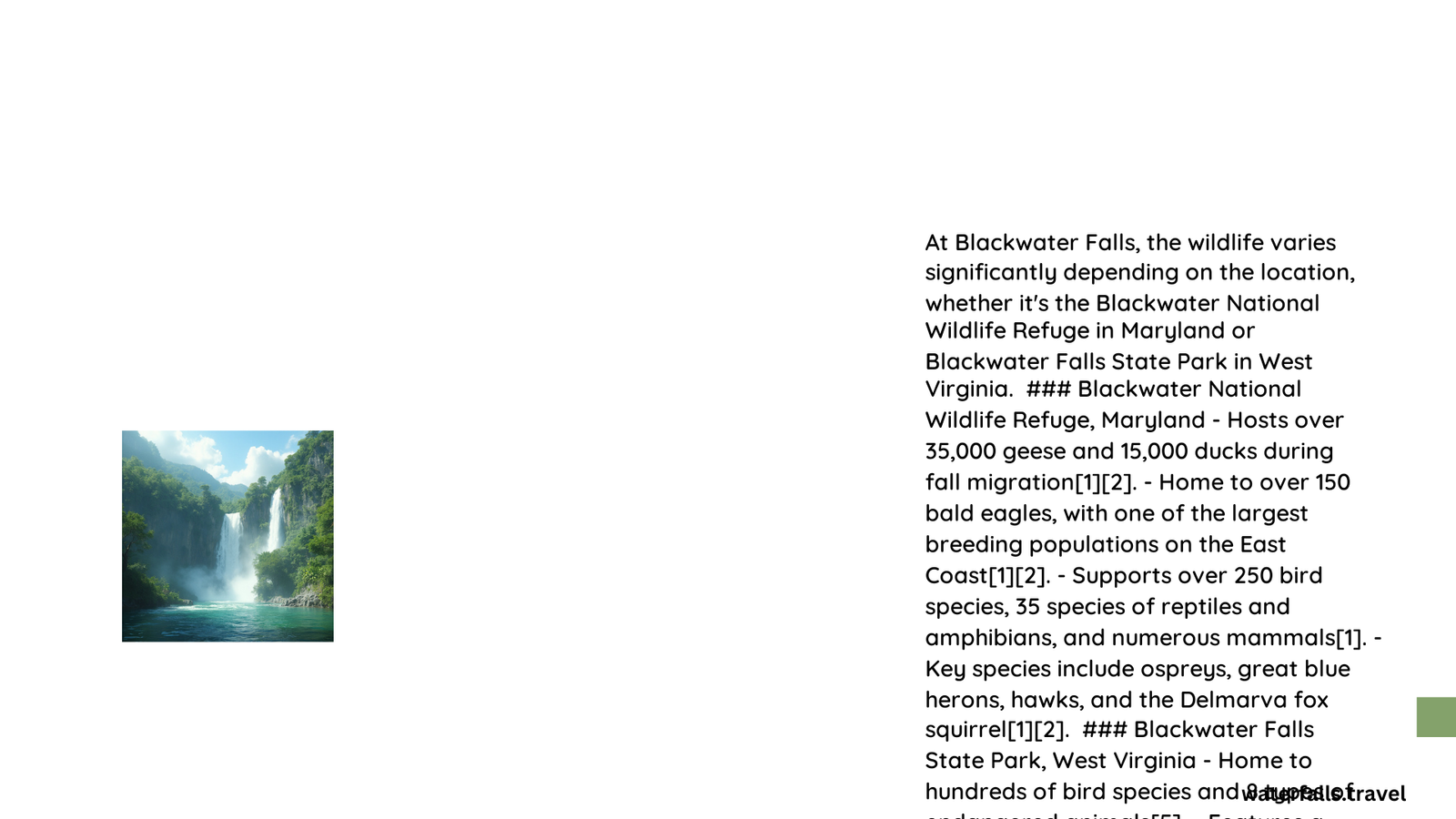Blackwater Falls State Park is home to a diverse array of wildlife, including mammals, birds, and amphibians. The park’s unique ecosystems, ranging from dense forests to cascading waterfalls, provide habitats for various species. Visitors can observe animals like the Delmarva fox squirrel, bald eagles, and rare salamanders. This guide explores the fascinating wildlife of Blackwater Falls, offering insights into their habitats, behaviors, and conservation status.
What Animals Can You Find at Blackwater Falls?
Blackwater Falls State Park boasts a rich biodiversity, hosting numerous animal species adapted to its varied ecosystems. Here’s a detailed look at some of the notable wildlife:
Mammals
- Delmarva Fox Squirrel
- Habitat: Mature forests with hardwood and pine trees
- Behavior: Ground-dwelling, foraging for nuts and seeds
-
Conservation Status: Recovering from endangered status
-
White-tailed Deer
- Habitat: Forests and meadows
- Behavior: Most active during dawn and dusk
- Conservation Status: Abundant in the park
Birds
- Bald Eagles
- Habitat: Forests near water bodies
- Behavior: Nesting in tall trees, hunting fish
-
Conservation Status: Recovered from endangered status
-
Osprey
- Habitat: Near water bodies
- Behavior: Skilled fish hunters
-
Conservation Status: Protected species
-
Great Blue Herons
- Habitat: Wetlands and water edges
- Behavior: Patient hunters in shallow waters
- Conservation Status: Stable population
Amphibians
- Cheat Mountain Salamander
- Habitat: High-elevation spruce-fir forests
- Behavior: Nocturnal, moisture-dependent
-
Conservation Status: Federally threatened
-
Wehrle’s Salamander
- Habitat: Well-draining hillsides
- Behavior: Secretive, found under rocks and logs
- Conservation Status: Locally abundant
Where Are the Best Spots to Observe Wildlife in Blackwater Falls?

Blackwater Falls offers several prime locations for wildlife observation:
- Blackwater River Trail
- Best for: Spotting aquatic birds and amphibians
-
Time: Early morning or late afternoon
-
Lindy Point Overlook
- Best for: Bird watching, especially raptors
-
Time: Midday for soaring birds
-
Elakala Trail
- Best for: Salamander sightings
- Time: After rainfall, when the forest floor is moist
What Are the Best Practices for Wildlife Viewing?
To ensure a safe and respectful wildlife viewing experience:
- Maintain a safe distance from animals
- Use binoculars or zoom lenses for close-up views
- Avoid feeding or approaching wildlife
- Stay on designated trails to protect habitats
- Keep noise levels low to avoid disturbing animals
How Does Blackwater Falls Protect Its Wildlife?
Blackwater Falls State Park implements several conservation measures:
- Habitat Protection
- Preserving large tracts of forest
-
Maintaining water quality in streams and rivers
-
Wildlife Monitoring
- Regular surveys of animal populations
-
Tracking endangered species
-
Public Education
- Interpretive programs about local wildlife
- Signage explaining ecosystem importance
What Unique Ecosystems Support Blackwater Falls Animals?
Blackwater Falls features diverse ecosystems that support its rich wildlife:
- Appalachian Mixed Mesophytic Forests
- Characteristics: Dense, diverse hardwood forests
-
Key Species: Delmarva fox squirrel, white-tailed deer
-
Riparian Zones
- Characteristics: Areas along rivers and streams
-
Key Species: Great blue herons, salamanders
-
High-Elevation Spruce Forests
- Characteristics: Cool, moist environments
- Key Species: Cheat Mountain salamander
When Is the Best Time to Visit for Wildlife Viewing?
The optimal times for wildlife viewing at Blackwater Falls vary by season:
| Season | Best For | Notable Species |
|---|---|---|
| Spring | Bird migrations | Warblers, thrushes |
| Summer | Amphibian activity | Salamanders, frogs |
| Fall | Mammal sightings | Deer, squirrels |
| Winter | Raptor watching | Bald eagles, hawks |
What Equipment Should You Bring for Wildlife Observation?
Essential gear for wildlife enthusiasts includes:
- Binoculars
- Field guide to local fauna
- Camera with zoom lens
- Waterproof boots
- Insect repellent
- Weather-appropriate clothing
By following these guidelines and respecting the natural habitats, visitors can enjoy the diverse wildlife of Blackwater Falls while contributing to conservation efforts.
References:
1. Blackwater National Wildlife Refuge | Species
2. An interactive guide to the blackwater river ecosystem
3. Delmarva Fox Squirrel: Discovering Its Unique Habitat and Behavior
